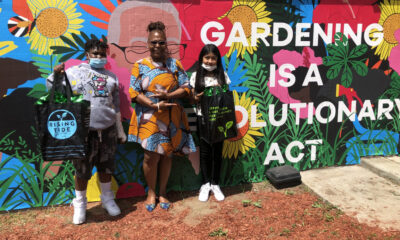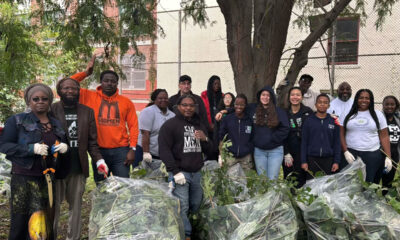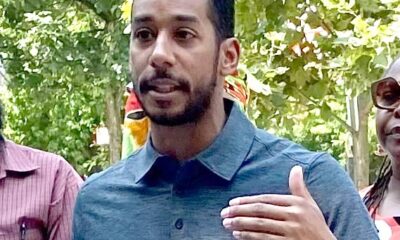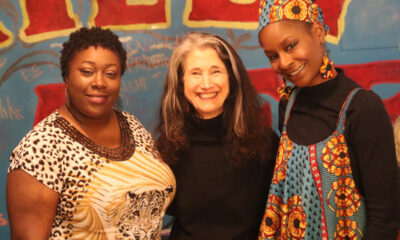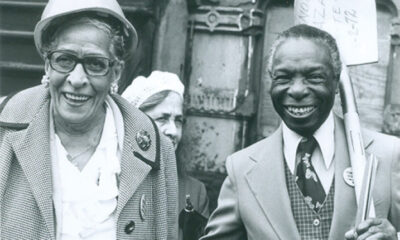Community News
Regular Residents, Phenomenal Acts.
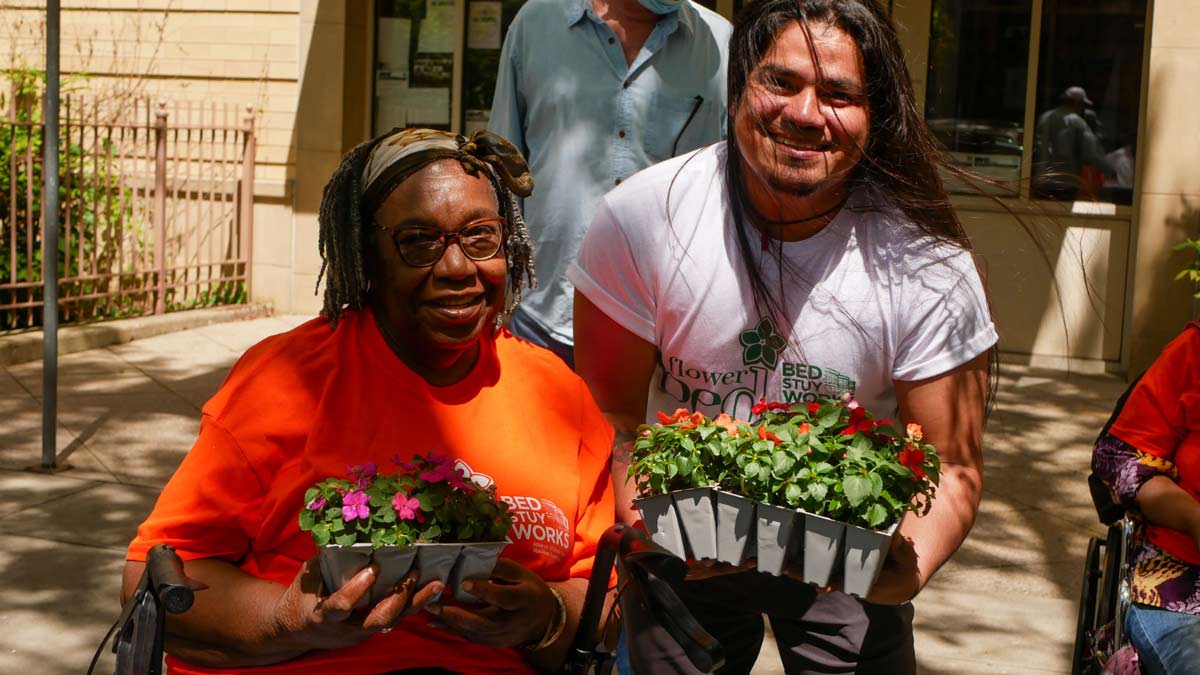
How small acts yield big environmental results
by Marlon Rice
Five years ago, the NASA Goddard Space Center in partnership with Dr. Reginald Blake and City Tech conducted a summer-long study of Bedford Stuyvesant and the urban heat island effect. Urban heat islands occur when cities replace natural land cover – such as trees and grass – with a dense concentration of concrete, asphalt, buildings, and other materials that absorb and retain heat.
The result of this phenomenon is that surface temperatures in urban heat islands are normally 3 to 7 degrees higher than in communities that are not urban heat islands. That slight uptick in heat causes an uptick in your energy bills, but more importantly, it also causes an uptick in heat-related illness and death.
Every day for the summer of 2019, Dr. Blake and his team flew a special drone over the community, charting air temperatures and surface temperatures, and logging that information. I had a chance to be a part of the project.
And, while I was fascinated with the work, I was also surprised that such an important and interesting project could be happening right in Bedford-Stuyvesant.
I decided to contact my friend and brother-in-community, Barry Cooper so that he could bring his Little Bro Summer Camp children to be a part of the day-to-day analysis.
On July 15, 2019, Barry bought a couple dozen kids to take part in the study. We gave each of the kids a digital thermometer and told them to chart various surface temperatures. They checked the sidewalks and the trees.
They checked the swings in the park and the benches. They logged their data, and then we sat around and discussed it all; a very simple act of including children from the neighborhood with regard to the very real work of environmental justice.
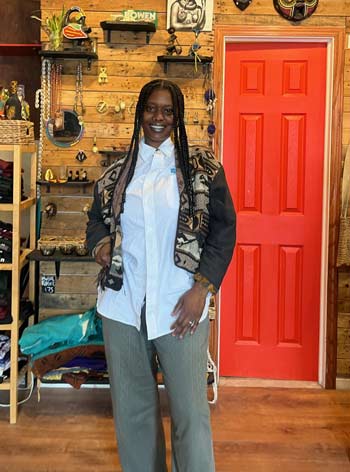
I bring this up because just last month I was in a store on Fulton Street when a teenage boy approached. I didn’t recognize the boy at all, but he recognized me.
He said, “You were one of the men that we measured surface temperatures with.” His statement took me back to that time, anytime before COVID seems like eons ago.
We had a brief conversation, and before we parted ways he said, “I’m going to plant some tomatoes with my grandma soon.” His parting words were a stark reminder of how incredibly easy it is to have environmentally responsible adults, by simply introducing environmental responsibility to children.
All across this community, residents and community-based orgs are accepting the task of enhancing the environmental profile of Central Brooklyn. And what are seemingly small steps are actually yielding large results.
Take Nicole Greaves, for example. Nicole is a lifelong resident of the community. She and I actually attended High School together. Today, she’s the Community Engagement Specialist with Bridge Street Development.
Among the many programs and partnerships Nicole oversees, for the last eight years, she has worked with the Bed Stuy Works Alliance of Resident Block and Tenant Associations on an initiative called Flower Bed-Stuy.
She explains the initiative, “Flower Bed Stuy is an annual event that is sponsored by the Alliance. It’s our annual community give back for our participating block, tenant, and resident associations.”
While the Alliance meets monthly and offers participants a wide range of information and discussions on everything from deed theft to what to do once you become an empty nester, Flower Bed Stuy is an opportunity for these associations to heed the call and improve the spirit of their block and community through gardening.
Nicole states, “One of the goals of the Alliance is to bring people together so that they can make their community safer, but also understanding that when you beautify a space you improve it.
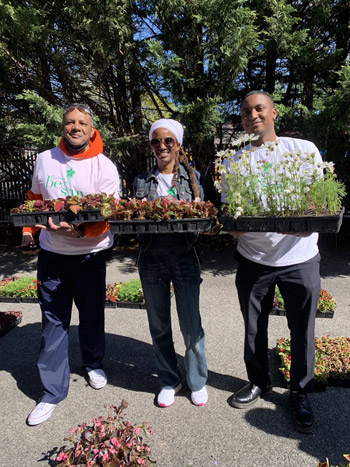
We all know that there is a lack of green spaces, and with the ongoing issues of mental health in our community we want to create these spaces, knowing that gardening is therapeutic.
We always want to use this initiative as a chance to bring the residents out onto the block, and to use gardening as a conduit to create connection and fellowship between neighbors.”
According to Nicole, the initiative has grown every year. “When I first started, we had close to 30 Block Associations that would participate.
This year, we are planning on over 50 Block Associations and 6 Merchant’s Associations to participate.
And, considering that each Block Association has a membership of roughly anywhere from 50 to 100 residents, Flower Bed Stuy easily connects with literally thousands of Bed Stuy residents.”
The resources that make Flower Bed Stuy a success come from various sponsorships and the donations of local elected officials. And, according to Nicole, the best part of the initiative is the effect that the flowers have on the community.
“My reason for working on Flower Bed Stuy, starting years ago as a participant, and then moving into a volunteer role, and now as an organizer is that I really enjoy walking around the community during the summer and seeing the flowers!
It is the most beautiful thing to go from one block to the next and to see that blocks are actually using the flowers to improve their blocks.
And so, I know for me walking and seeing these flowers makes me feel good and I’m sure it makes others feel good. And, I’ve seen it. I’ve seen people not throw trash because there were flowers.
I’ve seen people redirect their dogs away from the tree beds because there were flowers. So having the flowers actually causes people to respect the space, and to respect Bed Stuy.”
One of the regulars that you might see at Flower Bed Stuy is Chi Ossé. Chi is a lifelong resident of the community and also serves as the District’s Councilmember.
In his work, Chi gets the opportunity to advocate for, and ultimately pass legislation that can enhance the environmental profile of his neighborhood.
And, that opportunity isn’t lost on him. “My office absolutely understands that environmental protection includes everything from the macro level of combating climate change to the local level, including clean air, green spaces, and rat mitigation.
We support City and State efforts to make buildings more energy efficient and invest in renewable energy to power our electric grid.
Locally, we partner with groups like ACE to maintain clean parks, we invest in the Black environmentalist hub the Magnolia Tree Earth Center, and we implement our Rat Action Plan to ensure our neighborhoods are healthy and liveable.”
While Nicole works to use flowers to beautify the community, and while the Councilmember rolls out initiatives to keep the community energy efficient and healthy, Isha Maat is using her establishment to reinforce the concept of sustainability.
The owner and curator of Make Manifest on Tompkins Avenue is relying on her Caribbean roots and her holistic perspective to use her space to bring to light the concept of waste not, want not. For the second year, Isha will be using the Sunday before Earth Day to produce Sustainable Sunday.
She explains the concept, “Sustainable Sunday is an opportunity for the community to perform small acts of sustainability. So, there will be a clothing swap where people can bring clothes and take clothes.
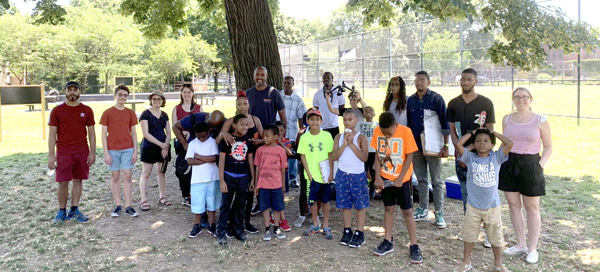
There will be an upcycle craft workshop where people can take cardboard to create vision boards or to use to create art. There will be a space to upcycle your clothing, kinda like customization in order to make something old into something new.”
For Isha, the concept of sustainability isn’t a new concept. It’s simply the traditional methodology of African peoples across the world. “I think sustainability is a big part of the nature of the diaspora. So in the Caribbean, we are always utilizing things to make other things out of it.
So, I think we come from a culture where we recycle naturally. When I was young, tubs and containers would turn into planters in my grandmother’s garden. So, it’s just really sustaining that culture of always looking to continue the use of something and not to waste just because.”
Crystal Jeffery had a career in law enforcement. That career was halted ten days before her 24th birthday when she was grazed by two bullets while on duty. After early retirement from NYPD, Crystal began a journey into entrepreneurship, finding success in real estate and even opening and operating a security training school.
The Brooklyn native made the decision to become a Board Member for the Magnolia Tree Earth Center in 2020 because she wanted to serve her community and to help rejuvenate the organization and its mission to provide environmental education to underserved communities.
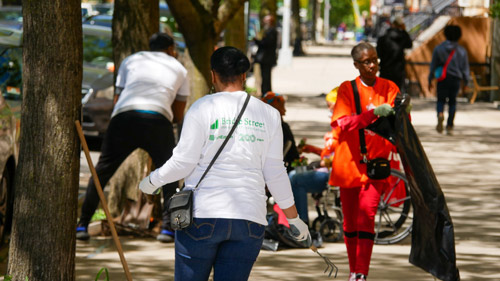
“I come from a family of farmers in Walterboro SC who lived off of their land. It’s funny how as you get older your DNA shines through. I always say that I represent a seed that was planted many moons ago and grew into a tree. I became interested in environmental justice and education by being a Board Member at MTEC.
The more I learned about MTEC and Hattie Carthan the more I fell in love with the mission of the organization. It fits in with what I’m about and represents. Urban Farming, ecological studies, horticulture, vocational studies, and wellness. Becoming your own resource for yourself, your family and your Community to live off of. Hattie Carthan once said why look to the government when you can help yourself.
She rallied several responsible people to help her to pioneer an environmental movement.”
What the former police officer and entrepreneur didn’t expect was how being a part of an organization designed to educate would actually be an educational experience for her. “As I began to do the work, I learned so much about the importance of our environment. I honestly lacked interest in the sciences.
I was always a mathematician in school who loved playing with numbers which is what prompted me to be an exceptional entrepreneur. My Earth Science teachers Mr Finkelstein & Mr Miller would be proud!”
Across the community, regular residents are continuing to do their part to keep Central Brooklyn green-minded and sustainable. And, as simple as it seems, this is the model of success – an all-hands on deck approach to ensuring that awareness and education are always made available through opportunity and programming.
Sustainable Sunday is happening on Sunday, April 21, 2024, at Make Manifest, located at 382 Tompkins Avenue from 1 pm – 6 pm. Flower Bed Stuy will happen on Saturday, May 4, 2024. For more information on that event, email Nicole Greaves at ngreaves@bsdcorp.org


